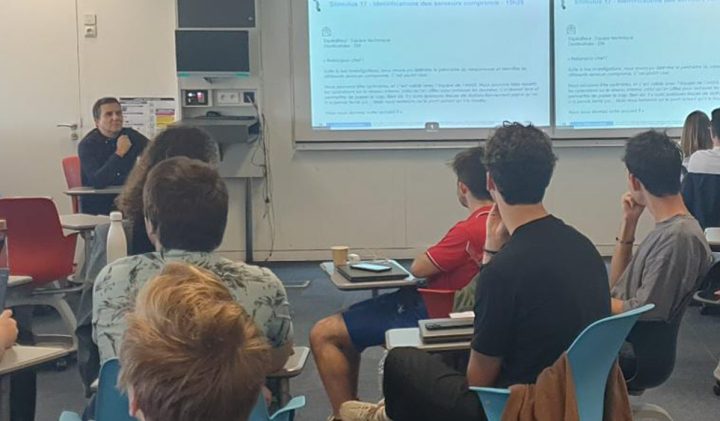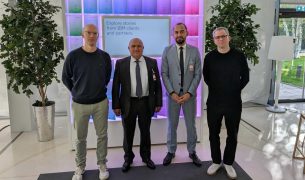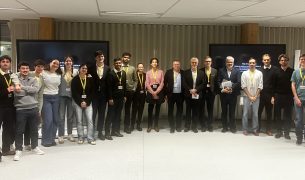In collaboration with Dr Paul Theron, ESILV organized a comprehensive 30-hour seminar on cyber resilience for its apprentice fourth-year students. The seminar featured a blend of lectures and hands-on crisis management exercises.
The objective was to simultaneously take these 180 students on an intensive classroom course, get them to think and work in teams on resilience concepts, and have them carry out a crisis management exercise. This initiative departed from traditional didactic teaching methods, emphasizing a participatory approach designed to engage students actively.
Promoting an intensive learning environment on corporate and cyber resilience topics
The seminar occurred during a dedicated block week, providing an intensive learning environment. Dr Theron’s presentations covered essential corporate and cyber resilience topics, starting from fundamental concepts of risk and risk assessment and progressing to developing continuity plans.
A significant seminar component involved a crisis management exercise set in a hospital scenario, which had been previously studied for risk assessment.
This exercise required students to collaborate and adapt in real-time, simulating the unpredictable nature of current crises.
Resilience and adaptive thinking on Cybersecurity issues
Key messages from the seminar emphasized the inherent unpredictability of crises and the necessity of thorough preparation. Students learned crises typically start with a systemic collapse, requiring rapid and flexible responses.
Dr Theron reinforced that while training and preparation are crucial, each situation presents unique challenges that necessitate adaptive strategies.
The importance of such initiatives at ESILV cannot be overstated. Preparing future engineers to navigate and manage crises effectively is essential in an increasingly volatile world.
By fostering resilience and adaptive thinking, ESILV ensures its graduates are well-equipped to face and mitigate the impacts of future challenges, contributing positively to their professional and personal development.
This programme is designed to equip students with the capabilities to navigate and lead in the rapidly evolving landscape of cyber threats and crisis scenarios, ensuring they are well-prepared for future challenges.
ESILV specialises in Cyber Resilience
For those who desire to specialise, ESILV proposes a one-year curriculum programme meticulously designed to provide students with an in-depth comprehension of cyber threats and the strategic resilience crucial for organisational triumph in the face of emerging cyber threats.
The MSc Cyber Resilience & Crisis Leadership programme is delivered over two semesters, enriching on-campus seminars with online content.
The modules range from fundamental courses such as ‘Cyber Security Basics’ to advanced studies in ‘Holistic Resilience’ and ‘Cyber Crisis Management’, each designed to build a solid foundation.
About Dr Paul Theron: A Pioneer in Cyber and Resilience Engineering
Dr Paul Theron is a distinguished expert in (cyber)resilience with over four decades of experience spanning various sectors and regions. His notable contributions have significantly advanced the global understanding and implementation of resilience and cybersecurity practices. He led the DG JRC expert team responsible for developing the European Cybersecurity Certification Framework (ECCF) under the Cyber Act. This work remains pivotal in shaping Europe’s cybersecurity landscape.
He has been a long-standing member and fellow of the Business Continuity Institute (BCI). He has contributed as an expert to ISO/Afnor standardization committees focused on national security, resilience, business continuity management (BCM), crisis management, and cybersecurity engineering for road vehicles.
During his tenure at Thales, Dr Theron directed critical missions in business continuity management, crisis management, drills, and significant studies on the [cyber] resilience of critical infrastructures, including telecoms, air traffic control (ATC), and defence. He also played a crucial role in establishing Oman’s Advanced Cyber Academy.





















